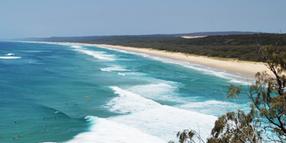Putting a lid on household recycling contamination
Explore Councils by state

“Keep it loose and clean. Don’t bag your recycling.”
These are the simple takeaways Redland City Mayor Karen Williams is urging residents to remember as part of a Council campaign to crush a worrying rise in recycling contamination.
“Just five types of materials can be recycled kerbside – paper, cardboard, glass jars and bottles, aluminium and steel cans and firm plastic containers and bottles,” Cr Williams said.
“But we are seeing a lot of other items in yellow-top bins, items that contaminate the load and waste our good efforts.
“The average rate for recycling contamination on the Redlands Coast had been going up since 2018, from 8 per cent to 11 per cent last year, and tracking at a disturbing average of 12.4 per cent in 2021.
Cr Williams said while she applauded residents for their enthusiastic recycling, meeting recycling targets meant more than shifting items from our general waste wheelie bin to the household recycling or green waste bin.
“The right materials need to go in the right bins,” she said.
“When a yellow-top wheelie bin has too much non-recyclable material – or contamination – it decreases the quality of recyclable materials and makes it harder for the good quality products to be extracted in the sorting equipment.
“As well as being a waste of renewable resources, this has the potential to increase Council’s, and therefore ratepayers’, waste management costs as the contaminated recycling may have to be taken to landfill.
“Household recycling is a commercial activity that Council pays for and when the quality decreases the processing costs increase.
“We do not want to reach the point where excess contamination costs may need to be passed on to ratepayers.
“That’s why we’re appealing to residents to not only recycle, but recycle right.”
Cr Williams said getting recycling right was not always easy but was something the council and community needed to work on together.
“With hundreds of recycling labels out there, it can be confusing and even recycling gurus can get it wrong,” she said.
“But the good news is that Australia and New Zealand have rolled out a new labelling information system for food packaging, called the Australasian Recycling Label (ARL), which, hopefully, will end this confusion.
“Planet Ark has run a “Check it! Before You Chuck It national campaign to raise awareness about the new labels, which it says provides easy-to-understand recycling information when you need it most.”
Cr Williams urged residents to check the labels and learn more about what items are okay to put in the yellow bins.
“If you’re unsure about an item, check Council’s online A-Z of waste recycling .”
CONTAMINATING MISTAKES TO AVOID
The main offenders:
Bagged items – residents should not place recycling into a kitchen tidy bag or garbage bag or place general waste in the recycling bin Soft plastics items such as bread bags, cereal box liners, pasta packets, chip packets, frozen veggie packets etc can only be recycled if taken to a specialised recycling collection point, such as the ones available in major supermarkets. Soft plastics cannot be processed through Council’s recycling facility and therefore cannot be placed in kerbside recycling. Bubble wrap Food scraps – including excess food in containers. Containers do not need to be fully rinsed before being placed in your recycling bin. Clothing / materials Polystyrene Plastic toys.